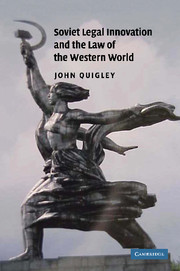Book contents
- Frontmatter
- Contents
- Abbreviations
- Preface
- Acknowledgments
- PART ONE THE SOVIET CHALLENGE
- 1 The Industrial Revolution and the Law
- 2 Economic Needs as Legal Rights
- 3 Equality in the Family
- 4 Children and the Law
- 5 Crime without Punishment
- 6 A Call to “Struggling People”
- 7 The Withering Away of Law
- PART TWO THE WEST ACCOMMODATES
- PART THREE THE BOURGEOIS INTERNATIONAL ORDER
- PART FOUR LAW BEYOND THE COLD WAR
- Notes
- Bibliography
- Index
4 - Children and the Law
Published online by Cambridge University Press: 27 July 2009
- Frontmatter
- Contents
- Abbreviations
- Preface
- Acknowledgments
- PART ONE THE SOVIET CHALLENGE
- 1 The Industrial Revolution and the Law
- 2 Economic Needs as Legal Rights
- 3 Equality in the Family
- 4 Children and the Law
- 5 Crime without Punishment
- 6 A Call to “Struggling People”
- 7 The Withering Away of Law
- PART TWO THE WEST ACCOMMODATES
- PART THREE THE BOURGEOIS INTERNATIONAL ORDER
- PART FOUR LAW BEYOND THE COLD WAR
- Notes
- Bibliography
- Index
Summary
The bolsheviks turned upside down the law on the legal status of children, on child-bearing, and on the upbringing of children. As we saw in Chapter 3, mother and father were to be equal in authority in making decisions about the upbringing of children. This legal equality of the parents gave a more prominent role to the mother. Additionally, a concept of the responsibility of society as a whole prompted other innovations. The Bolsheviks' economic analysis infused their approach as well.
Paternity
In one of its more radical features, the 1918 family code provided for collective paternity. If no man acknowledged a child, the mother could bring a legal action, as in other countries, to establish paternity. The innovation came in those situations in which the woman had had multiple sexual partners around the time of conception. In most countries, the court takes evidence to determine the identity of the child's father. But the 1918 family code, in a major departure, said that all the men should be financially responsible for resulting offspring. It mattered not which one actually fathered the child.
This provision produced negative results. Where courts ordered two or more men to pay support for a child, the mothers had difficulty enforcing the order against any of them. Experience under the 1918 code was that the multiple “fathers” felt no real obligation toward the child.
The 1926 code reverted to the traditional approach to paternity.
- Type
- Chapter
- Information
- Soviet Legal Innovation and the Law of the Western World , pp. 27 - 33Publisher: Cambridge University PressPrint publication year: 2007



